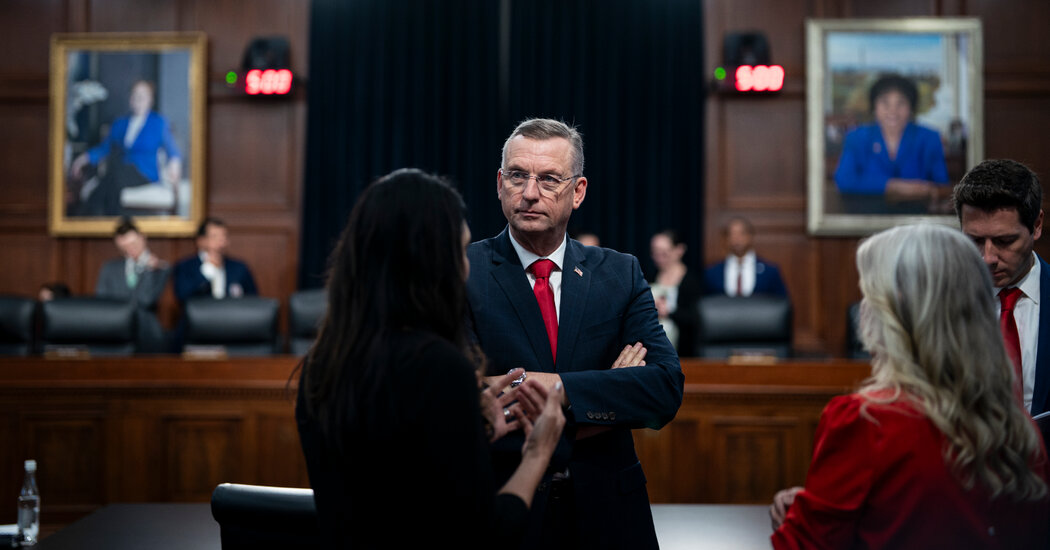During the confusing early days of the pandemic in spring 2020, there were a number of attempts at forging human connection, some more regrettable than others: things like the Houseparty app, socially distanced comedy specials, nightly essential worker celebrations, not to mention the social hegemon, Zoom.
And, of course, there were pandemic podcasts, which covered everything from the scariness of daily news to celebrations of minor tasks to quarantine-themed close reads of the “Twilight” series. More than a year later, many such shows have gone dark, as the world eagerly moves on.
One exception to the boom and bust of the quarantine content cycle is the podcast “How Long Gone.” The show, which premiered in March 2020, was born out of a Twitter joke between Chris Black and Jason Stewart. Longtime friends, they began posting, three times a week, hourlong FaceTime calls with each other and a grab bag of famous-ish friends and acquaintances in media, fashion, music and film. Early guests included the actress Tavi Gevinson, the writer Cat Marnell, the singer Phoebe Bridgers and the playwright and screenwriter Jeremy O. Harris.
Now, more than 200 episodes later, “How Long Gone” has become a staple for many media insiders, culture makers, very online people and even your average “bro” — making it a clubhouse for the chattering classes.
Its mix of Twitter-centric water cooler talk, free-form bull session, and a deluge of takes “sprayed” by its hosts has pushed the podcast to outgrow its origin story. Within months of their first episode, the show reached monthly listener figures in the six digits, they cracked the top 50 on Apple’s comedy charts and were asked to host a new podcast for Spotify: “How Long Gone Radio.”
It’s even earned them a special kind of celebrity.
“People at Erewhon are starting to recognize us,” said Mr. Black, 39, of the trendy grocery store in Los Angeles, where he and Mr. Stewart live.
Punching Up
“How Long Gone” billed itself as a “bicoastal elite podcast from old friends” in its inaugural episode. There is, to be sure, some truth to the bicoastal elite thing. Mr. Black works as a consultant for fashion brands like Thom Browne and writes for culture magazines; he keeps an apartment in New York City, where he used to live. And Mr. Stewart, 41, is a prolific podcaster on his own, having first made his name as a party D.J. with Steve Aoki’s Dim Mak crew in the early 2000s.
During one recent episode featuring A.J. Daulerio, a former editor of Gawker and Deadspin, the pair opened the show by covering a spree of trending topics: a viral milk story published on Grub Street, milk crate challenges and the appearance of one of Mr. Black’s tweets (about the milk story) in a New York Post story.
“The milk story was brilliant because everyone has an opinion on it,” Mr. Black said during the episode. “And it’s absolutely meaningless.”
Once the giggling and verbal horseplay subsided, they yielded the floor to Mr. Daulerio, who talked about the drug abuse that marked his reign at Gawker and about his new Substack, which focuses on subjects like substance abuse and recovery. (Mr. Black sometimes uses the podcast to speak openly about his past struggles with drug abuse and his current sobriety.)
Their conversation soon settled into a broader discussion of New York publishing, their preferred newsletter subscriptions and media consumption habits. Mr. Black is fond of print magazines and Airmail, Graydon Carter’s once-a-week email newsletter. Mr. Stewart is less interested in print media and prefers to listen to articles on the Pocket app.
“This is my favorite New York media podcast,” Mr. Daulerio said at one point. He added with some wonder: “You guys can say ‘fire’ and ‘bro’ so effortlessly.”
Attributing the show’s steady success to its insider-baseball-like chats or the hosts’ exaggerated takes on just about everything under the sun would miss the point. There’s likely a more simple explanation: the appeal of two grown men engaging in nontoxic masculinity.
“It’s rare and special and eternally fun to listen to people who are really close, who can point out each other’s flaws in a healthy and positive way,” Mr. Stewart said, on a recent Zoom call with Mr. Black. “Negativity is not entertaining to us.”
Mr. Black added: “Just in a lighthearted, fun way. I like punching up.”
They are, of course, far from the first pair of friends to turn genuine rapport into digestible content. Last November, Vogue cited “How Long Gone” as proof of the rise of the “bro-cast,” but noted that the format had been popularized quite successfully by women-led shows like “Call Your Girlfriend,” hosted by two “long-distance besties,” long before the quarantine era.
Another podcast built around a close personal rapport is “Red Scare,” hosted by Anna Khachiyan and Dasha Nekrasova. The podcast’s focus is political and generally takes up a trolling critique of liberal feminism in all its forms, but Ms. Nekrasova attributes a large degree of the show’s success to the friendship that is centered in each episode. She came on “How Long Gone” last November after receiving an Instagram message from Mr. Black, whom she knew little about.
And with so many podcasts operating like mere “friendship simulators,” as Ms. Nekrasova calls them, she was surprised by the ease with which Mr. Black and Mr. Stewart integrated her into their pop culture musings. “It’s clear what they have is real,” she said. “Most podcasts take a while to develop a friendship, especially when it’s front and center to the show. But it’s easy for them. They’re good at keeping that ball in the air.”
At a ceaseless pace, they have leveraged their micro-celebrity to pursue their own low-stakes interests. Multiple runs of hats, tote bags and a $40 “Performance” Nalgene bottle — mostly designed by Mr. Stewart — have sold out, they said. They have released their own brand of “snapchilled” canned coffee, named Mudd, and for a short while, Angelenos could start their day with “the Goner,” a vegan breakfast sandwich made in collaboration with local chain Burgerlords.
Still, they haven’t put their podcast behind a paywall, opting for more aesthetically aligned sponsorships with companies like the podcasting platform Anchor.FM. “We want as many people to hear this podcast as possible, and if you put a paywall up that’s not going to happen,” Mr. Black said.
“People don’t really want to support us that much,” Mr. Stewart added, dryly.
Nor have they fully abandoned their day jobs. Mr. Stewart consults for other podcasts, while Mr. Black works with fashion clients. With audiences hyper-attuned to all things that could be deemed performative, and listeners and viewers ever more cynical to the dynamics of self-branding, Mr. Black and Mr. Stewart seem to have dialed into the right frequency of realness.
“There are loads of podcasts that are intelligent and well researched, but they don’t necessarily have people I wish I was hanging out with,” said Raven Smith, a columnist for Vogue, who has been a guest on the show.
It was through a Thom Browne project that Mr. Harris, the writer, first met Mr. Black. The two quickly hit it off and Mr. Harris was invited onto the podcast, becoming one of its earliest guests.
“There’s a casual intellect that moves past a lot of the performance that one sees in podcasts,” Mr. Harris said of the show’s hosts. “They have an overwhelming sense of curiosity in who you are and the world you’re a part of. And that’s what sets them apart. They are classic radio hosts.”
Together, Apart
Mr. Black and Mr. Stewart have yet to record an episode in the same room. However, this fall, they are planning to take the show into the real world after being signed by High Road Touring, a talent booking agency. “Goners,” as the show’s fans are referred to, will be able to see a “David Letterman-style” live show during an 11-city tour across the country. An Oct. 23 appearance at the Bowery Ballroom in New York is sold out.
The podcast has a record deal now, too, with the independent label Jagjaguar, home to Bon Iver, Angel Olsen and other musicians. Jagjaguar will release the debut “How Long Gone” album as a part of its 25th anniversary celebration.
Both hosts came of age toiling in the music industry — Mr. Black used to manage the pop punk band Cartel in the early 2000s — so their record deal fits squarely with their history.
And more broadly, it also may indicate that a successful podcast, in a cultural moment marked by digital novelty, is a quick path to social cachet.
“Through the pod we’ve been able to clearly see how to accomplish a lot of the dreams and goals in our lives,” Mr. Stewart said. “We’ve been able to pull from all the worlds we’ve been a part of and inject it into this experiment that we’re doing. Every little thing can be done the way you want to do it.”
Much like their music industry debut, which, Mr. Black noted, will be released as a double compact disc.
“It’s just a fun thing to do,” he said. “Tapes are corny. Vinyl is corny. CDs are cool.”










